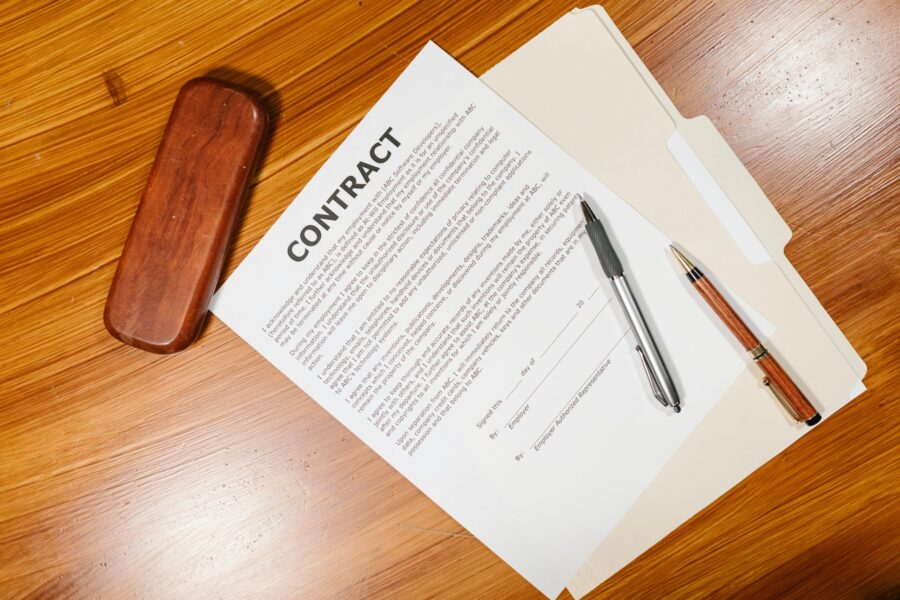
What Is a Material Breach of Contract?

A material breach of contract, sometimes referred to as a “failure to perform” or “total breach,” occurs when one party to a contract fails to uphold the terms of the agreement in a way that renders the contract meaningless. In other words, a material breach defeats the purpose of the contract because it goes to the heart of the agreement and undermines the primary goal of the contract. Material breaches are the most severe type of breach.
If a material breach occurs, the non-breaching party can typically end the contract, get out of any financial obligations they have to the other party, and sue the breaching party for damages in court. The courts consider numerous factors to determine whether a breach of contract is material.
Was the Main Purpose of the Contract Fulfilled?
A material breach involves a significant failure to fulfill the main objective of an agreement. For instance, if someone contracted a construction company to build a house at a specific location, and the construction company built the home on the wrong lot, that would constitute a material breach of contract. If the house were constructed in the wrong place, that would render the agreement pointless.
However, if the house was built in the correct location and the construction company simply installed the wrong flooring, that probably would not rise to the level of a material breach of contract. In that case, the breach of contract was minor and could be remedied. While the non-breaching party can still recover damages for a non-material breach of contract, the core purpose of the contract (building the house on a specified lot) would still be fulfilled.
Can the Issue Be Resolved with Money?
If the alleged breaching party can remedy the breach of contract at a reasonable expense or can compensate the other party for its losses, then the breach of contract probably won’t be considered material.
For instance, in the example above, the construction company could simply replace the flooring with the flooring the homeowner originally requested, and that would resolve the breach of contract. If the issue can be resolved, the homeowner probably couldn’t cancel their contract.
However, building the house on the wrong lot would be far more difficult and costly to remedy. Therefore, building the house in an incorrect location would be considered a material breach.
How Much Does the Breaching Party Stand to Lose?
If the breaching party has mostly fulfilled its obligations under the contract, it will be more difficult for the other party to accuse the breaching party of a material breach. If a landowner hires a construction company to build their new house, and the house is nearing completion, the construction company stands to lose a lot more money (and time) than if the landowner accused the company of a breach early in the construction process. If the alleged breaching party has mostly fulfilled its end of the bargain, then any breach of contract is less likely to be considered material.
Did the Breaching Party Act in Good Faith or Bad Faith?
A breach of contract is more likely to be deemed material in court if the breaching party acted in bad faith. If the breach occurred through simple carelessness, it is less likely to be considered material.
How Likely Is It That the Breaching Party Will Remedy Things?
If there’s a good chance of the breaching party fixing the issue, the breach might not be material. For instance, if the breaching party can provide reasonable assurance that they can uphold their end of the bargain, the breach could be deemed non-material. However, if the breaching party cannot provide assurance that they will remedy the problem, the breach might be deemed material, and the non-breaching party could end the agreement.
Is the Non-Breaching Party Prepared to Perform Their Obligations Under the Contract?
The non-breaching party can’t simply say that the other party committed a material breach. If the non-breaching party hasn’t already upheld its end of the bargain, it must be able to demonstrate that they are “ready, willing, and able” to uphold the terms of the contract. If the non-breaching party can’t show that they’re able to fulfill their end of the deal, they may not be able to successfully sue the other party for a material breach.
Does the Contract Have a Clause That Dictates What Constitutes a Material Breach?
Sometimes, contracts contain a clause that spells out what constitutes a material breach. By including this guidance in the contract, the parties can avoid any ambiguities if disputes arise. For instance, if an agreement between a homeowner and a construction company states that missed payments constitute a material breach of contract, then the construction company could end the contract and sue for their losses if the homeowner fails to make payments.
Contact Us
If you have suffered losses due to a material breach of contract, contact a California contract attorney at Wagner Zemming Christensen, LLP. During a confidential consultation, we will discuss your situation and help you evaluate your legal options. Call us today at 951-686-4800.



